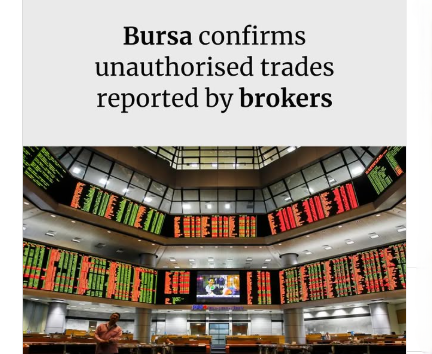The financial industry in Malaysia has been dealing with a digital tsunami in recent days. In addition to upsetting the peaceful hum of retail investing, a coordinated hacking operation targeting local stock trading accounts has brought up important issues regarding the cybersecurity preparedness of the area.

Remarkably reminiscent of recent events in Japan, the attacks allegedly used compromised login credentials and foreign IP addresses to carry out illegal trades. Like cyber puppeteers pulling invisible strings, the attackers manipulated the price of thinly traded penny stocks by surreptitiously breaking into online brokerage accounts, many of which were created without prior approval for online trading. They then cashed out on the inflated surge.
| Key Detail | Description |
|---|---|
| Target | Online trading accounts at multiple Malaysian brokerages |
| Attack Vector | Unauthorized access via foreign IPs, exploiting inactive permissions |
| Modus Operandi | Pump-and-dump of penny stocks using compromised user accounts |
| Regulatory Response | Reports filed with Bursa Malaysia and the Securities Commission |
| Market Impact | FBM KLCI closed up 0.36%, showing short-term resilience |
| Similar Global Case | Japan: 8 major brokers affected, halted certain stock orders |
| Status | Extent of breach still under joint investigation |
What Systemic Fragility Is Shown by the Hack
To put things in perspective, these weren’t the high-tech lapses of legendary movies. Rather, accounts with inactive permissions and inadequate verification layers were the disturbingly basic vulnerability that was exposed by the breach. Despite its seemingly insignificant size, this type of digital backdoor is extremely dangerous given the interconnected architecture of financial systems.
The hackers were able to manipulate trading patterns and generate fictitious demand in low-volume stocks by taking advantage of this oversight. In actuality, it’s comparable to staging a rush at a street vendor’s booth and then selling your inventory for a premium as customers swarm in.
From Tokyo to Kuala Lumpur, a ripple
In its first report on the brokerage hacks in Japan, Bloomberg explained how unauthorized trades were initiated on several platforms. It is now impossible to overlook the parallels. Malaysia’s hack appears to be the next step in a developing regional trend rather than an isolated incident, as Rakuten Securities and SBI Securities have already tightened their regulations.
The new trend points to a coordinated criminal effort rather than sporadic criminal ingenuity, possibly even utilizing shared tools and credentials that were stolen from larger dark web marketplaces. What transpired in Malaysia is not an isolated breach in this context. It is a copy of a blueprint.
The bright side: disruption as a means of preparation
On the day of the announcement, Malaysia’s primary market index, the FBM KLCI, ended the day higher despite the breach. That in and of itself is especially comforting. Investors have not panicked, as evidenced by the regulators’ admirable prompt and lucid response. The Securities Commission and Bursa Malaysia promptly verified that brokers were actively attempting to evaluate and contain the breach, and that investigations were in progress.
These institutions might have avoided more destabilization if they had worked together early and openly. In times of crisis, that level of openness is very effective at preserving market stability and managing public trust.
A Time to Reevaluate Protections for Retail Investors
The incident serves as a clear reminder to retail investors that two-factor authentication is no longer adequate, despite its usefulness. Brokers must implement multi-layered security frameworks that anticipate and prevent threats rather than just responding to them. Businesses can identify odd activity, such as penny stock orders from dormant accounts, before the damage worsens by incorporating AI-driven anomaly detection.
Brokerages should also start using risk-based authentication, biometric access tools, and real-time trade alerts. These are necessities in the fintech space, not extravagances.
